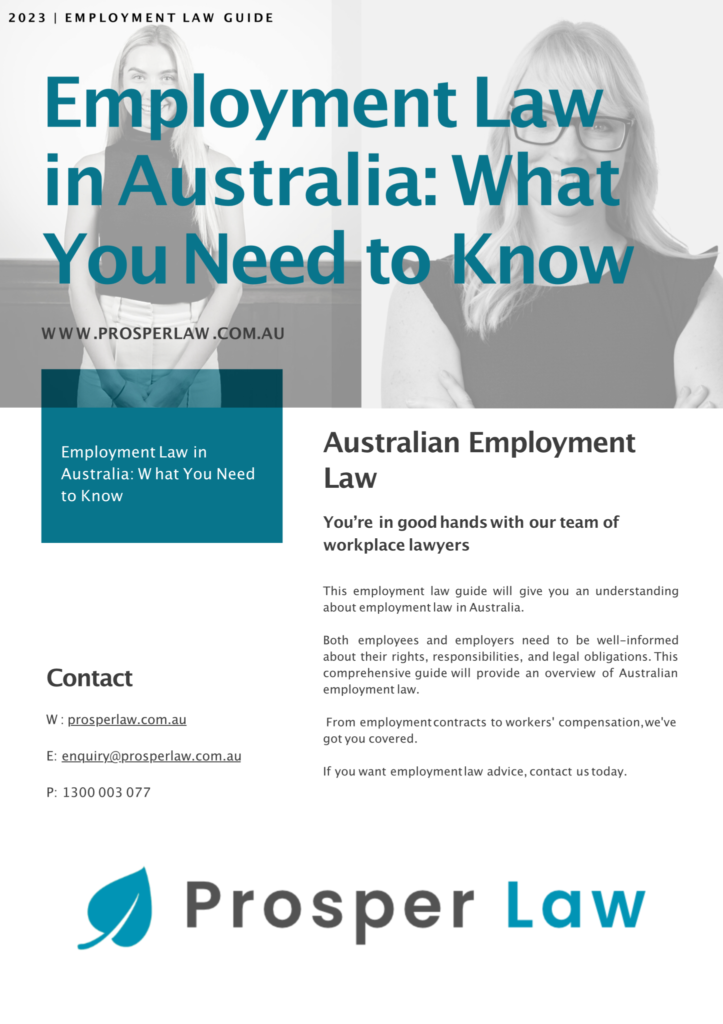Probationary periods in employment contracts are an important part of workplace law in Australia. An employment probationary period is the length of time that an employer and an employee must decide whether the employment relationship is suitable. If the employer or employee is not happy with the employment, they can end the contract.
The time needed to end a work contract in the trial period is usually shorter than after the trial period ends. An employment contract review may determine what the appropriate probationary period is, what is specified in the employment contract or assist in case of dispute.
In this article, we’re going to detail the law surrounding probationary periods in employment contracts.
Importance of Probationary Periods
A probationary period is an important aspect of an employment contract for the following reasons:
Probationary periods sets expectations
Probation periods in employment contracts are crucial for establishing expectations and assessing job suitability for both the employer and employee. These periods serve as a means to evaluate whether the job is a good fit for both parties involved.
During testing, the employer checks if the employee’s skills match their expectations. The employee also sees if the work culture, duties, and role expectations are what they expected.

Termination of employment during a probationary period
Although the Fair Work Act 2009 (Cth) does not provide a specific definition for probationary periods, they are relevant when it comes to unfair dismissal claims. The jurisdictional threshold for unfair dismissal claims varies based on the size of the business:
1. Small businesses with fewer than 15 employees: Employees cannot seek unfair dismissal remedies if they have worked for less than 12 months.
2. Large-scale firms with at least 15 employees: Workers must have at least 6 months of employment to qualify for certain perks.
Sections 382 and 383 of the Fair Work Act 2009 (Cth) are the relevant provisions and they state:
382 When a person is protected from unfair dismissal
A person is protected from unfair dismissal at a time if, at that time:
(a) the person is an employee who has completed a period of employment with his or her employer of at least the minimum employment period; and
(b) one or more of the following apply:
(i) a modern award covers the person;
(ii) an enterprise agreement applies to the person in relation to the employment;
(iii) the sum of the person’s annual rate of earnings, and such other amounts (if any) worked out in relation to the person in accordance with the regulations, is less than the high income threshold.
383 Meaning of minimum employment period
The minimum employment period is:
a) if the employer is not a small business employer – 6 months ending at the earlier of the following times:
(i) the time when the person is given notice of the dismissal;
(ii) immediately before the dismissal; or
(b) if the employer is a small business employer – one year ending at that time.

What happens if the probationary period in an employment contract is different to the Fair Work Act?
No relationship exists between the Fair Work Act unfair dismissal tenure threshold and an employment contract.
However…
If a probationary period is less than the relevant threshold in the Fair Work Act (6 months for larger businesses and 12 months for small businesses), and an employer seeks to dismiss the employee after the probationary period described in the employment contract but before the tenure threshold, things can get complicated.
Example: An employment contract provides for a probationary period of 3 months. An employee successfully passes their 3-month probationary period. However, after 5 months the large business employer decides to dismiss the employee.
The employee will not be entitled to bring an unfair dismissal claim (because the 6-month threshold has not been met under s 383 of the Fair Work Act). However, the employee can sue the employer for breach of contract.
Where the contracted probationary period is longer than 6 months
On the other hand, if a probationary period stated in an employment contract is greater than the minimum employment period, the employee will nevertheless be entitled to an unfair dismissal remedy. In this scenario, to the extent the probationary period exceeds the minimum employment period, it is largely redundant.
What happens if there is no probationary period in an employment contract?
An employment contract review should pick up if there is no probationary period described in an employment contract.
However, if this process has been skipped over and the employment contract is silent regarding the probationary period, then:
- the employer can only terminate the employment contract in accordance with the terms of the contract (and no contractual probationary period applies); and
- the employee can only seek an unfair dismissal remedy after the minimum employment period.

Can a probationary period in an employment contract be extended?
A probationary period can only be extended if an employee agrees.
If a probationary period is extended beyond the minimum employment period, the agreement to extend the probationary period will not override the Fair Work Act. This means that as soon as the employment continues beyond 6 months (or 12 months in the case of a small business), the employee has access to the unfair dismissal protections.
Examples of legal cases relating to employment probationary periods
In this case, the employee started her employment with a probationary period of 6 months. During this period, the employer raised performance issues with the employee. After the first probation period, the employer added 3 more months and began managing the employee’s performance.
The employee’s performance gradually improved, meeting expectations in seven out of ten criteria by November 2018. However, at the end of the extended probation period, the employer extended it again for a further two weeks. Eventually, the employer terminated the employee’s contract, stating that she would be unable to demonstrate appropriate levels of efficiency or responsibility in her role.
The worker filed a lawsuit claiming unfair termination. She argued that she performed her job effectively and there was no valid reason for her dismissal. The Fair Work Commission (FWC) found that the employer incorrectly believed they had the right to terminate the contract due to the employee not successfully completing the probationary period. The FWC determined that the employee was unfairly dismissed and awarded her compensation of over $8,000.
This case highlights the significance of assessing an employee’s performance during the probationary period. It also emphasizes the importance of having valid reasons for termination. Finishing a probationary period doesn’t mean an employer can fire an employee without a valid reason.



